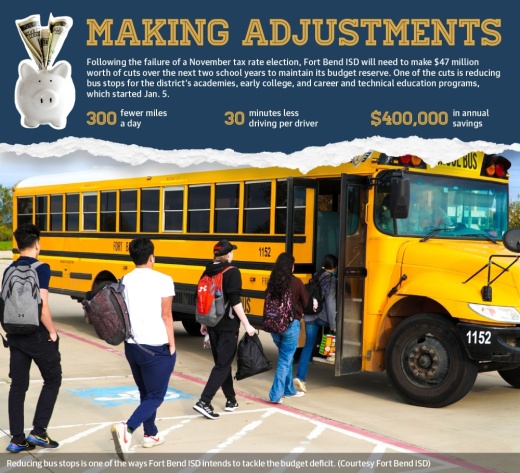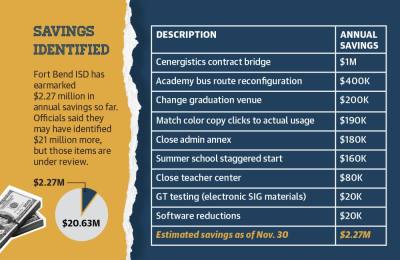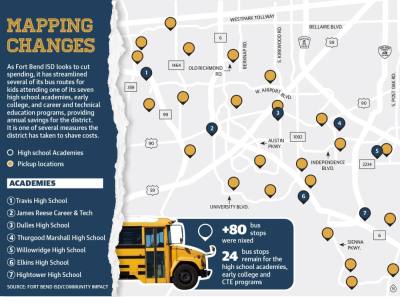However, 54% of voters denied a proposition during the election that would have resulted in a $0.0755 tax rate increase and an additional $47.7 million in revenue.
With the vote, district officials said they have lost the opportunity to pay for additional compensation adjustments, programs and safety measures—goals FBISD outlined in its tax rate election campaign.
“That’s a little challenging, and it may have a sting,” FBISD Superintendent Christie Whitbeck said in a Nov. 9 video statement to parents. “But we will roll up our sleeves, and we will work together.”
In August, FBISD committed to making $23 million in cuts for the 2023-24 school year; with the election’s failure, the district will need to cut another $24 million in 2024-25 to maintain its budget reserve.
One savings option the district implemented is reducing the bus stops for its Academy programs.
This comes as the 88th Texas legislative session began Jan. 10, expected to span through May 29. School funding is among the bills under discussion at the Legislature, where FBISD officials said they believe it is likely the district will receive more financial support from the state. This also comes as the district considers a May bond election; FBISD had originally planned to ask voters to approve a bond election in November but pushed it to 2023 to prioritize the tax rate election.
Despite voters denying the tax rate election, FBISD officials said they are confident a May bond would pass.
“A bond is very different [than a tax rate election],” FBISD Deputy Superintendent Steve Bassett said. “People are used to that. Everybody just understands it so much more.”
Finding solutions
So far, FBISD had identified $2.27 million in annual savings as of Dec. 5. Closing the district’s administration annex building on Sweetwater Boulevard will save $180,000 annually; changing the 2023 graduation venue to FBISD’s Mercer Stadium saves $200,000; and staggering the district’s start of summer school saves another $160,000, according to district data.
Still, by the time the FBISD board of trustees approves the district’s 2023-24 budget in June, it will need to cut an additional $20.63 million. District officials said during a Dec. 5 meeting other cuts have been identified, but they were unable to discuss them publicly.
Heading those efforts is Stephanie Williams, FBISD’s executive director of teaching and learning, who leads the district’s Design Team. The 12-member team has been tasked with creating a plan for any programs, processes or positions that may need to be cut.
“What we’re hoping with this change management and communication plan is that we help stakeholders make sense of the why behind the change,” Williams said at the Dec. 5 meeting.
The Design Team worked with the district’s transportation department and has identified $400,000 in annual savings by streamlining the district’s bus route system for its academies, early college, and career and technical education programs. The programs offer concentrated course pathways through career and academic classes, according to FBISD’s website.
Starting Jan. 5, with the streamlined approach, the district cut more than 80 bus stops, 300 miles per day and 30 minutes of driving per driver per day.
“We’re not taking away any service from kids, and we’re still providing service, but we’re doing it a little less expensively,” FBISD Executive Director of Transportation Mike Jones said.
May bond
While FBISD still needs to identify an additional $20.63 million in cuts for the 2023-24 school year, the district is also considering a May bond election to address facility needs, Bassett said.
The district has yet to finalize a bond amount that would go before voters in May, but Bassett said it might be the same $1.2 billion the district announced in August it would postpone to focus on November’s tax rate election.
That bond included $1.064 billion in major facility projects to address rebuilds, new schools and renovations. It also included $559 million in addressing life cycle needs, $5.6 million for safety and security, $6.7 million for transportation, $100 million in technology purchases and $3.2 million worth of land, according to district documents.
Bassett said despite one of the factors that contributed to the failure of the tax rate election—high inflation, which hit 7.1% Dec. 15, according to the U.S. Bureau of Labor Statistics—he is confident a bond could pass in May.
“Because we postponed the bond—it was originally going to be 2021—we can definitely demonstrate the needs,” Bassett said.
Legislative priority
FBISD was among the districts looking to pass tax rate increases or approve bond propositions in November. While Katy ISD joined FBISD in failing to pass a tax rate increase, Lamar CISD had three bond propositions approved worth $1.5 billion for safety and security, buildings and technology.These measures have become more necessary statewide as districts look to meet their needs while state funds have stagnated, said Bob Popinski, director of policy at education nonprofit Raise Your Hand Texas.
This is because the state provides districts a basic allotment of $6,160 per student with formula adjustments putting the average payment at about $10,000 per student, Popinski said. That places Texas $4,000 behind the national average for per-pupil spending and in the bottom 10 in the nation.
“As far as school funding goes, it’s going to be one of the key issues that’s going to be discussed with a $27 billion-plus surplus in the current [Texas] budget,” Popinski said. “There’s going to be a big conversation of ... how we move the system and funding forward.”
To more properly fund school districts, RYHT recommends increasing the basic allotment to more than $7,000 per student. As school districts plan budgets every year, the organization is also asking the Legislature to implement an automatic inflation adjustment tied to that basic allotment.
FBISD officials said that adjustment could help address the shortfall.
“If they do [add an adjustment], then it would be able to do enough to cover raises, not just for teachers, but also for other staff and to help address the deficit,” Bassett said.
Fort Bend ISD has earmarked $2.27 million in annual savings so far. Officials said they may have identified $21 million more, but those items are under review.







